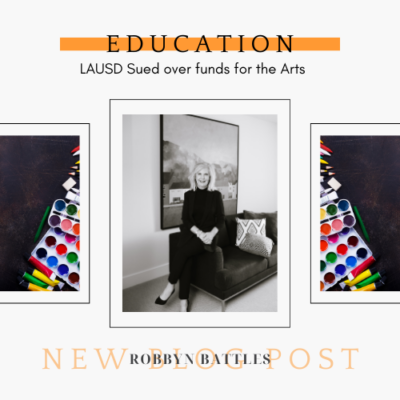 In February 2025, a lawsuit was filed against the Los Angeles Unified School District (LAUSD), alleging the misuse of funds designated for arts education under California’s Proposition 28. This legal action, initiated by parents and educators, claims that LAUSD failed to provide the mandated arts programs, particularly affecting low-income and minority students. Parents like Vicky Martinez express frustration over the lack of arts education, noting its potential benefits for students’ mental health and engagement. Educators and unions, including the United Teachers Los Angeles (UTLA), support the lawsuit, emphasizing the district’s responsibility to adhere to the law and provide equitable arts education opportunities. This lawsuit highlights the challenges districts face in implementing state mandates and the importance of transparency and accountability in fund allocation. It underscores the need for clear guidelines and oversight to ensure that designated funds effectively enhance educational programs as intended. Ed Source article
In February 2025, a lawsuit was filed against the Los Angeles Unified School District (LAUSD), alleging the misuse of funds designated for arts education under California’s Proposition 28. This legal action, initiated by parents and educators, claims that LAUSD failed to provide the mandated arts programs, particularly affecting low-income and minority students. Parents like Vicky Martinez express frustration over the lack of arts education, noting its potential benefits for students’ mental health and engagement. Educators and unions, including the United Teachers Los Angeles (UTLA), support the lawsuit, emphasizing the district’s responsibility to adhere to the law and provide equitable arts education opportunities. This lawsuit highlights the challenges districts face in implementing state mandates and the importance of transparency and accountability in fund allocation. It underscores the need for clear guidelines and oversight to ensure that designated funds effectively enhance educational programs as intended. Ed Source article
Understanding Proposition 28 Proposition 28, passed by California voters in November 2022, was designed to enhance arts and music education across public schools by allocating additional funds specifically for these programs. The initiative mandates that a minimum of 1% of the state’s Proposition 98 funding be dedicated to arts education, aiming to enrich students’ learning experiences through increased access to creative disciplines. This funding is intended to supplement existing arts education budgets, not replace them, ensuring that schools expand their arts programs. Notably, at least 80% of the funds must be used to employ certificated or classified employees to provide arts instruction, while up to 20% can be allocated for training, supplies, materials, and arts educational partnership programs. cde.ca.gov
The Lawsuit Against LAUSD The lawsuit alleges that LAUSD misused approximately $76.7 million of Proposition 28 funds by allocating them to existing programs rather than expanding arts and music education as intended by the proposition. The plaintiffs, including former LAUSD Superintendent Austin Beutner and several district families, contend that this misallocation has deprived students, particularly in underprivileged areas, of the enriched arts education promised by the initiative. They argue that instead of hiring additional arts educators or enhancing arts programs, the district used the funds to cover existing staff salaries, undermining the proposition’s goal of expanding arts education. laist.com
LAUSD’s Response In response, LAUSD has stated that it has not been formally served with the complaint but emphasizes its commitment to adhering to state guidelines for Proposition 28 implementation. The district asserts that it follows the state’s guidance to ensure full compliance with the proposition’s requirements. However, internal communications suggest that the district may have used the funds to cover existing staff due to staffing challenges, a move critics argue undermines the proposition’s intent. abc7.com
Challenges in Implementation Implementing Proposition 28 has presented challenges, especially in schools located in underprivileged neighborhoods. Despite the proposition’s intent to provide equitable arts education, systemic issues such as budget constraints, staffing shortages, and competing academic priorities often hinder the successful deployment of arts programs in these areas. Additionally, some districts have considered using Proposition 28 funds to sustain existing positions rather than creating new opportunities, which critics argue undermines the initiative’s goal of expanding arts education. calmatters.org
Recommendations for Effective Use of Proposition 28 Funds
To address these issues and ensure the effective use of Proposition 28 funds, the following recommendations are proposed:
- Transparent Reporting: Districts should publicly disclose detailed reports on the allocation and utilization of Proposition 28 funds, enabling stakeholders to monitor compliance and impact.
- Community Engagement: Active involvement of parents, educators, and community members in planning and decision-making processes can help tailor arts programs to meet local needs and ensure that funds are used effectively.
- Targeted Support for Underprivileged Schools: Allocating additional resources and support to schools in economically disadvantaged areas can help overcome systemic barriers and promote equitable access to arts education.
- Regular Audits: Implementing periodic audits by independent bodies can ensure that funds are used per the proposition’s stipulations and help identify areas for improvement.
By adopting these measures, school districts can uphold Proposition 28’s promise of ensuring that all students, regardless of their socioeconomic background, have access to quality arts and music education.
Footnote: Understanding Proposition 98 and 28
Proposition 98, passed in 1988, amended the California Constitution to guarantee a minimum percentage of the state budget for K-12 schools and community colleges. The funding is sourced from the state’s General Fund, comprising revenues from personal income, sales, and corporate taxes. Proposition 98 does not involve new taxes or bonds; instead, it ensures that a specified portion of existing state revenues is dedicated to education annually. ballotpedia.org
Proposition 28 (2022): This measure mandates that a minimum of 1% of the prior year’s K-12 Proposition 98 funding be allocated specifically for arts and music education. Similar to Proposition 98, the funds for Proposition 28 are drawn from the state’s General Fund. This allocation is in addition to the existing Proposition 98 guarantee, ensuring dedicated resources for arts programs without introducing new taxes or bonds. cde.ca.gov

